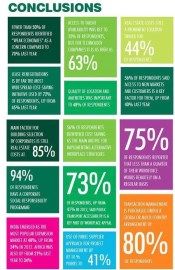by Brianna Crandall — February 10, 2014—Corporate decision makers are responding to signs of economic improvement across Europe by shifting focus away from pure cost management to future growth opportunities, according to the latest annual European Occupier Survey conducted by global real estate advisor CBRE. The survey drew responses from more than 70 corporate occupiers in Europe representing leading corporations, covering a range of sectors and industries.
The survey, now in its fourth year, polls corporate real estate decision makers at global corporations collectively occupying approximately 2.7 billion sq. ft. (250 million sq m) worldwide. The survey shows corporates’ increased confidence in the economic recovery, with less than half (46%) identifying weak economies as a concern. In 2012 the overwhelming majority (70%), reported that the uncertain economic outlook in Europe was a key factor in their real estate strategy, with cost management being the primary objective.
Cost control
Despite such positive signs, cost control remains a priority for corporates. The survey shows almost three-quarters (72%) renegotiated leases in the past twelve months (compared to 45% in 2012), to “lock in” deals while office rents are at, or close to, the bottom of the market. However, such efforts to reduce costs are likely to diminish as the recovery continues.
Space optimization
In addition, 61% of companies reported that they have reduced their real estate footprint by occupying space more efficiently. Such space optimization strategies are increasingly prominent for corporates due to the balancing act between cost savings (reported by 56% as a key driver of alternative workplace strategies) and providing a collaborative working environment (39%) with the aim of improving employee productivity (37%).
CBRE notes that it is therefore interesting to see that the vast majority of companies are not widely adopting remote working strategies, with 75% reporting that less than a quarter of staff work flexibly on a regular basis. This indicates that the office environment is still key, which explains the focus on improving the quality of the workplace, concludes the firm.
Optimal work environment
This leads to companies placing greater emphasis on providing staff with the right environment in the right locations. Although cost is the principal factor when companies choose office space (cited by 85%), 45% of companies report that they see the quality of their workspace as integral to attracting and retaining talent. In turn, 73% or three-quarters believe public transport accessibility is important to staff, with the provision of “value-add” amenities such as an on-site gym or restaurant (48%) and flexible workspace (48%) also important. Overall, the results indicate that for occupiers, a central, amenity-rich location that provides lifestyle options for the workforce outside the work environment is crucial.

As CRE teams become more strategic and client focused, CBRE expects an increased emphasis on producing ideal working environments, and a continued focus on outsourcing.
(Click on image to enlarge)
International expansion
As the economic outlook improves, multinational companies are demonstrating an appetite for international expansion into new markets. The survey demonstrates this, with more than half of corporates (56%) naming access to new markets and customers as the principal driver for location decisions. This broad appetite for expansion sees India and Africa emerge as destinations of choice. When asked to identify where they intended to expand their operations, 48% named India (double the figure from 2012 at 24%), with China mentioned by 42% (down from 60% in 2012).
The report also indicates a significant increase in the number of corporates intending to expand into Africa. This target market is now identified by a third of respondents (34% today), versus a fifth (21% in 2012). In the case of both India and Africa, rapid population and economic growth, coupled with increasing transparency and improving infrastructure, is removing many of the traditional barriers to entry.
Outsourcing
The shift in corporate focus towards the future is also refocusing attention on the corporate real estate (CRE) function, according to the report. There is now a greater desire for increased alignment between real estate activities and broader business objectives, with 72% of companies surveyed noting this as an area for improvement. This indicates that with the correct management, CRE functions could become facilitators of future growth, with the knock-on effect of increased CRE outsourcing, notes CBRE.
Conclusion
As corporate real estate teams become more strategic and client focused, CBRE expects an increased emphasis on producing ideal working environments in order to improve employee productivity and boost talent retention (noting that labor outlay is more expensive than real estate costs), and expects the trend of outsourcing to continue.





